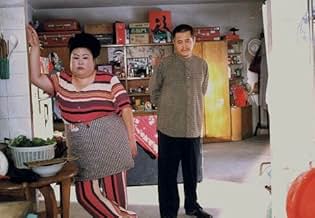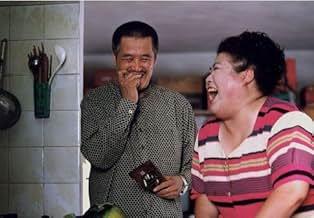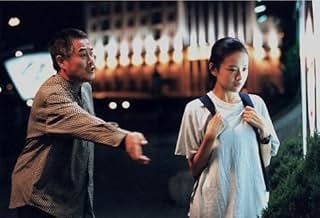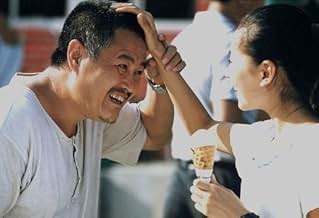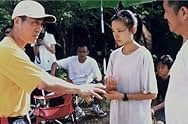IMDb रेटिंग
7.3/10
4.3 हज़ार
आपकी रेटिंग
अपनी भाषा में प्लॉट जोड़ेंAn aging bachelor has to engage his old, laid-off friends to keep a blind girl happy as a masseuse at a non-existent massage parlor.An aging bachelor has to engage his old, laid-off friends to keep a blind girl happy as a masseuse at a non-existent massage parlor.An aging bachelor has to engage his old, laid-off friends to keep a blind girl happy as a masseuse at a non-existent massage parlor.
- पुरस्कार
- 5 जीत और कुल 4 नामांकन
फ़ीचर्ड समीक्षाएं
There is, in this world, many parents, siblings or grandparents are, but they always angry, especially when it comes to their loved ones. His "generosity" is full of contempt, anger and I think that self-frustration for failing to more fortunate children or grandchildren or more committed to themselves. This giving is worth very little, because the recipient feel humiliated, and love is hate and what does not grow in his heart, first by himself, by being forced to receive from whoever stain, and second, that which gives because he knows that, at bottom, despises him.
There is in this world, and fortunately, people who are eager to give and to serve because he feels playing the role for which he was born, then, when given the heart, there is nothing more rewarding for humans to feel that someone has released a fix or which has helped improve their quality of life. Being that really works, do not expect rewards, for the simple flow makes you feel full, and instead wanted to thank you, it is he who gives them for being in a state of abundance.The sincere and loving act of giving is an act of creation because it is spreading, confidence and hope.
It is this that comes Zhao, a man old enough and who, wishing to mate with a plump woman conflictive existence, just knowing Wu Ying, a sweet blind teenager who, motherless and abandoned by her father with his stepmother, he began to feel that, this woman is charging the resentment what she feels for his volatile father. Zhao, take time to under the beautiful Wu and begin a long quest to get her access to the happy times, while getting to make sense of their existence.
Yimou's film, soon to look at the classic Charles Chaplin "City Lights" but his personal touch and very oriental, manages the film with feel and certain charm, though - it must be said - without the immense magic and poetic warmth that has the now classic work of Charlot. However, at the end one feels that, with grace and wisdom, "Happy Times", has shown a path that gives meaning to existence, and so, well deserve our warmest applause.
There is in this world, and fortunately, people who are eager to give and to serve because he feels playing the role for which he was born, then, when given the heart, there is nothing more rewarding for humans to feel that someone has released a fix or which has helped improve their quality of life. Being that really works, do not expect rewards, for the simple flow makes you feel full, and instead wanted to thank you, it is he who gives them for being in a state of abundance.The sincere and loving act of giving is an act of creation because it is spreading, confidence and hope.
It is this that comes Zhao, a man old enough and who, wishing to mate with a plump woman conflictive existence, just knowing Wu Ying, a sweet blind teenager who, motherless and abandoned by her father with his stepmother, he began to feel that, this woman is charging the resentment what she feels for his volatile father. Zhao, take time to under the beautiful Wu and begin a long quest to get her access to the happy times, while getting to make sense of their existence.
Yimou's film, soon to look at the classic Charles Chaplin "City Lights" but his personal touch and very oriental, manages the film with feel and certain charm, though - it must be said - without the immense magic and poetic warmth that has the now classic work of Charlot. However, at the end one feels that, with grace and wisdom, "Happy Times", has shown a path that gives meaning to existence, and so, well deserve our warmest applause.
This film will either get to you like a death in the family, or leave no lasting impression on you whatsoever. I'm among those who fit in with the first part. Maybe family death is exaggerating but that doesn't matter, this is still A VERY POWERFUL FILM. This film proves that ZHANG YIMOU IS THE BEST DIRECTOR ALIVE (as Alferd Hitchcock and Akira Kurosawa are dead). The best actor in this film is actually the blind girl (sure, she's no River Pheonix, but who is?) who always gives you the impression that she's blind (unlike some American actors in American films). Yet she happens to know more than you think in the end (no spoilers on that). To see this film on the big screen was too much, 10 out of 10. Oh, and watch out for Hero, from the same director of this.
No longer partnered, artistically or domestically, with the stunning Gong Li, director Zhang Yimou has probably redeemed himself with Party satraps through his engaging serio-comic "Happy Days." (He's been in and out of hot water with past films.) Destined to reach a miniscule audience in theaters, this touching film ought to be widely viewed when released for sale or rental.
Set in an unnamed Chinese city (definitely not Beijing), the story revolves around retired factory worker Zhau, just over fifty, and a blind teenager, Wu Ying, stepdaughter of the corpulent and avaricious woman the impecunious Zhau seeks as a wife. Wu Ying, blind since early childhood from a tumor, has to deal not only with her witch of a stepmom (dad fled from her and is supposedly in a far off city working to send money to bring his daughter to him) but with her stepbrother, a bulbous slobus amoebus training to match his mother's nastiness.
Zhau has a covey of good friends. His first get rich scheme, hatched up with his closest friend, is to "restore" a derelict bus in a park to its pristine state so it can be rented for quick, hot sheet assignations ("Happy Times Hotel"). Americans will find the Chinese take on non-marital, catch-as-catch-can sex naive but it reflects tension balanced by humor in a country where the citified young seek freedoms their elders never enjoyed.
The core of the story is Zhau's attempts to take care of Yu Wing after the evil stepmom throws her at Zhau and tells him to get her out of the house and keep her out. With his friends, all equally hovering near or under the poverty line, Zhau sets Yu Wing up as a masseuse in a fake massage parlor in a decrepit abandoned factory, the legitimate kind of parlor, not the type I heard about when an Army officer in severalAsian countries (Yu Wing was trained to give massages).
I won't reveal the lengths Zhau and his gang go to in their effort to sustain Yu Wing and make her happy. Some of their scheming is very funny. The ending reflects, hardly for the first time, Zhang Yimou's skill not only as a top director but also as a talented storyteller.
I've never seen the actor and actress who play the leads before. They simply blend their performances convincingly into a seamless story that says more about the possibilities and rewards of empathy and the joys of caring than it does about modern China. The locales here range from an affluent downtown to a condemned, empty factory. There's hardly any politics. It's sad, though, that a decent, retired factory worker can't spring for a 25 yuan Haagen Daz small cone offered in a shop that could have been imported from Main Street.
Put this one on your to-rent list!!
Set in an unnamed Chinese city (definitely not Beijing), the story revolves around retired factory worker Zhau, just over fifty, and a blind teenager, Wu Ying, stepdaughter of the corpulent and avaricious woman the impecunious Zhau seeks as a wife. Wu Ying, blind since early childhood from a tumor, has to deal not only with her witch of a stepmom (dad fled from her and is supposedly in a far off city working to send money to bring his daughter to him) but with her stepbrother, a bulbous slobus amoebus training to match his mother's nastiness.
Zhau has a covey of good friends. His first get rich scheme, hatched up with his closest friend, is to "restore" a derelict bus in a park to its pristine state so it can be rented for quick, hot sheet assignations ("Happy Times Hotel"). Americans will find the Chinese take on non-marital, catch-as-catch-can sex naive but it reflects tension balanced by humor in a country where the citified young seek freedoms their elders never enjoyed.
The core of the story is Zhau's attempts to take care of Yu Wing after the evil stepmom throws her at Zhau and tells him to get her out of the house and keep her out. With his friends, all equally hovering near or under the poverty line, Zhau sets Yu Wing up as a masseuse in a fake massage parlor in a decrepit abandoned factory, the legitimate kind of parlor, not the type I heard about when an Army officer in severalAsian countries (Yu Wing was trained to give massages).
I won't reveal the lengths Zhau and his gang go to in their effort to sustain Yu Wing and make her happy. Some of their scheming is very funny. The ending reflects, hardly for the first time, Zhang Yimou's skill not only as a top director but also as a talented storyteller.
I've never seen the actor and actress who play the leads before. They simply blend their performances convincingly into a seamless story that says more about the possibilities and rewards of empathy and the joys of caring than it does about modern China. The locales here range from an affluent downtown to a condemned, empty factory. There's hardly any politics. It's sad, though, that a decent, retired factory worker can't spring for a 25 yuan Haagen Daz small cone offered in a shop that could have been imported from Main Street.
Put this one on your to-rent list!!
There is no doubt in my mind that Zhang Yimou is one of the world's finest film makers. He manages to straddle the bounds of both art house and commercialism with his catalogue of works that show a beauty and grandeur that often earns the description "painterly", whilst also telling a really good story. Happy Times is something of a departure from works like Raise The Lantern and Shanghai Triad, being a fairly realist comedy.
Happy Times ("Happy Times Hotel" on the print) is about a group of 'retired' (laid off) factory workers who conspire to hoax a young blind girl. Not as callous as it sounds though, as their intentions are relatively good. The main characters are a 50 year old bachelor (Zhao Benshan) and the blind girl herself, played by newcomer Dong Jie. A small crowd of interesting friends and the gargantuan love interest/stepmother of the leads pad out the cast, which mostly plays out in a couple of small locations - two cramped flats, a sprawling abandoned warehouse, and a delapidated bus.
It's very much a character piece, focussing mainly on the relationship that develops between Zhao Benshan and Dong Jie, thrust together under circumstances that neither planned. It's a tender story... a little bit happy, a little bit sad. Bittersweet I guess, but only slightly bitter.
Zhang Yimou forgoes his usual luscious cinematography for quite a naturalistic feel. Apparently he used "hidden cameras" to shoot some of it, but I've no idea what that means (maybe the street scenes?). It's quite a simple piece, a light 95 minutes long, yet still crafted with the dexterity and care that Zhang Yimou always brings to a film. Being a character piece, it is very much dependent on the performances for success - Zhang could coax an oscar winner out of a mannequin, but Dong Jie here is especially good. If I hadn't seen her walking around the theatre unattended, I would certainly have believed she was genuinely blind (this is not an easy thing to act), and her emotional expression is spot on too. You couldn't possibly not care for her character, or that of Zhao Benshan.
The movie might be quite 'slight' in Zhang Yimou's filmography - it's unlikely to win any oscars for him, but it is a nicely made movie that I think everybody can enjoy.
Happy Times ("Happy Times Hotel" on the print) is about a group of 'retired' (laid off) factory workers who conspire to hoax a young blind girl. Not as callous as it sounds though, as their intentions are relatively good. The main characters are a 50 year old bachelor (Zhao Benshan) and the blind girl herself, played by newcomer Dong Jie. A small crowd of interesting friends and the gargantuan love interest/stepmother of the leads pad out the cast, which mostly plays out in a couple of small locations - two cramped flats, a sprawling abandoned warehouse, and a delapidated bus.
It's very much a character piece, focussing mainly on the relationship that develops between Zhao Benshan and Dong Jie, thrust together under circumstances that neither planned. It's a tender story... a little bit happy, a little bit sad. Bittersweet I guess, but only slightly bitter.
Zhang Yimou forgoes his usual luscious cinematography for quite a naturalistic feel. Apparently he used "hidden cameras" to shoot some of it, but I've no idea what that means (maybe the street scenes?). It's quite a simple piece, a light 95 minutes long, yet still crafted with the dexterity and care that Zhang Yimou always brings to a film. Being a character piece, it is very much dependent on the performances for success - Zhang could coax an oscar winner out of a mannequin, but Dong Jie here is especially good. If I hadn't seen her walking around the theatre unattended, I would certainly have believed she was genuinely blind (this is not an easy thing to act), and her emotional expression is spot on too. You couldn't possibly not care for her character, or that of Zhao Benshan.
The movie might be quite 'slight' in Zhang Yimou's filmography - it's unlikely to win any oscars for him, but it is a nicely made movie that I think everybody can enjoy.
This one's up to Zhang Yimou's usual standard, and like his other movies, revolves around an unfortunate female, in this case a young blind woman. Set in modern urban China, this movie often has a lighter touch than most of his others. Although the movie credits cite a story by Mo Yan, "Shifu, You'll do Anything for a Laugh" as the basis of the movie, the connection is highly tenuous, borrowing little more than the main character from that short story; namely, a middle-aged, laid-off factory worker, played by Zhao Benshan (best known to Chinese audiences as a comedic actor). The economic changes in modern China form the background to his relationship with the blind girl he finds himself thrown together with as he tries to court her step-mother.
I'd like to see someone pick this one up for distribution and given a better English title.
I'd like to see someone pick this one up for distribution and given a better English title.
क्या आपको पता है
- ट्रिवियाDirector Zhang Yimou issued a casting call via the Internet for role of the blind girl. Eventual lead Dong Jie was selected from some 40,000 girls who auditioned for the role.
- इसके अलावा अन्य वर्जनSPOILER: There are two cuts of this film; the original Chinese Theatrical Cut and an International Cut, which is six minutes longer. The International Cut features more content in the early scenes when the two couples come to the Happy Times Hut hoping to have sex. In the Chinese cut, these scenes are more ambiguous as to what the couples have in mind. Additionally, the International Cut has a longer and very different conclusion. In the Chinese cut, after Zhao (Benshan Zhao) writes the letter supposedly from Ying's father, the film cuts to him reading it to her as the credits start to role. In the International Cut, however, after Zhao leaves the restaurant in which he writes the letter, he is hit by a car. In hospital, his friends come to see him, finding the letter to Ying (Jie Dong). Upon returning to her apartment, however, they find it deserted. A tape recording Ying has made and left behind explains that she knew all along the Happy Times Hotel didn't exist, but she didn't mind as they were the happiest days of her life. She then explains that she is going to Shenzhen. After the message is finished, Fu (Biao Fu) plays it again, reading aloud Zhao's letter at the same time. The film then cuts to Ying walking along a crowded city street as the credits role.
- कनेक्शनFeatured in Late Night with Conan O'Brien: Martin Lawrence/Los Lobos (2002)
टॉप पसंद
रेटिंग देने के लिए साइन-इन करें और वैयक्तिकृत सुझावों के लिए वॉचलिस्ट करें
- How long is Happy Times?Alexa द्वारा संचालित
विवरण
- रिलीज़ की तारीख़
- कंट्री ऑफ़ ओरिजिन
- आधिकारिक साइटें
- भाषा
- इस रूप में भी जाना जाता है
- Happy Times
- फ़िल्माने की जगहें
- उत्पादन कंपनियां
- IMDbPro पर और कंपनी क्रेडिट देखें
बॉक्स ऑफ़िस
- बजट
- $19,00,000(अनुमानित)
- US और कनाडा में सकल
- $2,40,093
- US और कनाडा में पहले सप्ताह में कुल कमाई
- $31,084
- 28 जुल॰ 2002
- दुनिया भर में सकल
- $3,61,000
- चलने की अवधि
- 1 घं 42 मि(102 min)
- रंग
- ध्वनि मिश्रण
- पक्ष अनुपात
- 1.78 : 1
इस पेज में योगदान दें
किसी बदलाव का सुझाव दें या अनुपलब्ध कॉन्टेंट जोड़ें








